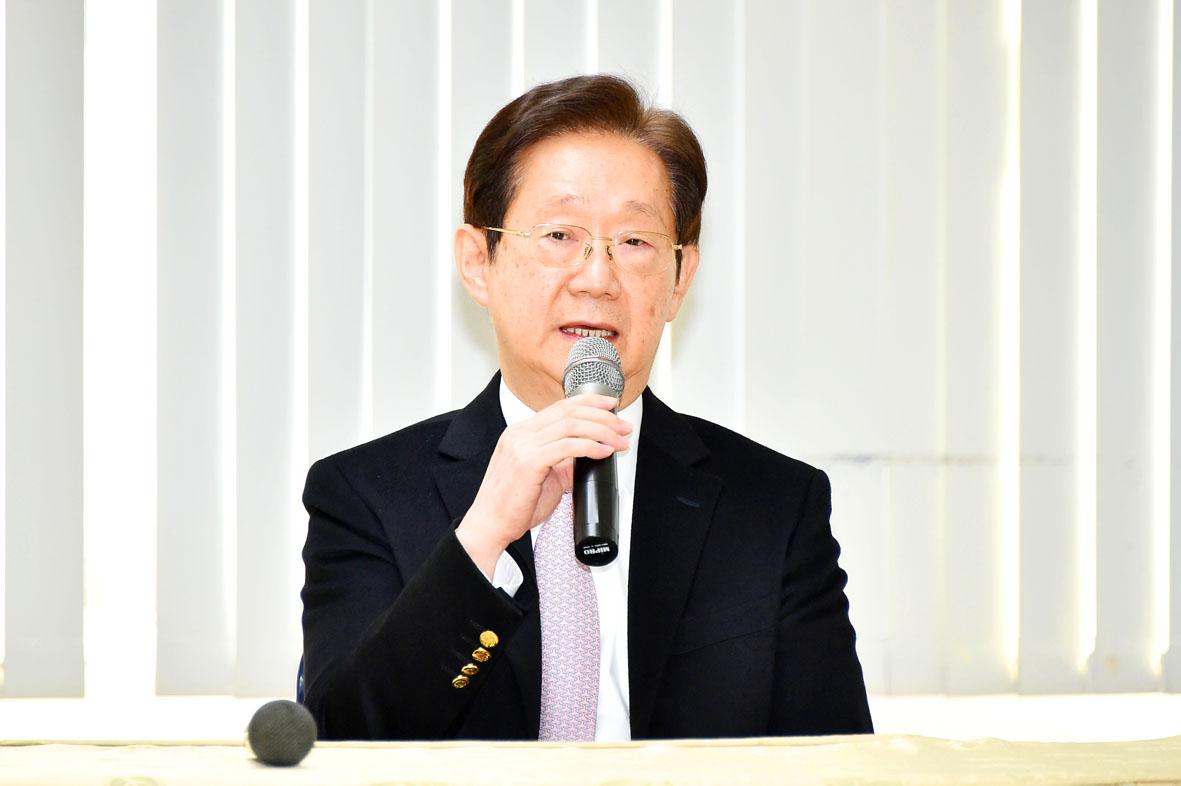After just 50 days on the job, Tatung Co (大同) chairman Lin Wen-yuan (林文淵) has been dismissed.
Lin made the announcement at a news conference in Taipei yesterday, saying that he “does not know exactly why myself” the reason for his tenure being cut short.
Lin said that he had “minor differences of opinion” with Tatung’s leading investor, Shanyuan Group (三圓建設) chairman Wang Kuang-hsiang (王光祥), who informed Lin on Monday last week that he would be replaced.

Photo: Tu Chien-jung, Taipei Times
“I asked him why. What did I do wrong? He said: ‘Nothing, but it’s now a different time with different circumstances,’” said Lin, describing a conversation with Wang.
When asked to name a point of friction with Wang, Lin said that Wang wants to be Tatung vice chairman.
“He mentioned it at the very first board meeting. I told him it was on the table, but we have to amend some company by-laws first,” Lin said.
“As the largest shareholder, Wang thought his suggestion should be accepted, but there are possible legal ramifications,” he said.
Lin said that he did not know who would take over at Tatung, but an announcement is scheduled for today.
His picks for Tatung president, Tang Cheng-jen (湯政仁) and chief financial officer Chen Ming-nan (陳明男), have already tendered their resignations.
The Chinese-language Mirror Media weekly reported that Lin’s choices for president were questioned by former Tatung chairwoman Lin Kuo Wen-yen (林郭文艷), who remains on the board, citing lack of experience.
Tang was an assistant professor of electrical engineering at Tatung University for 17 years before founding a start-up, SourceTec Co (思源資訊).
Lin Wen-yuan, who is also chairman of Eastern Broadcasting Co (東森電視), said that he had “given it my all” in his effort to turn around the beleaguered company after being made chairman on Nov. 2.
He was brought in by Wang after a group of activist investors led by Wang wrested control of the company away from Lin Kuo Wen-yen, the last representative of the founding Lin family at Tatung.
At a news conference last month announcing Lin Wen-yuan’s appointment as chairman, he and Wang promised that it would be “a new Tatung” and the end of years of boardroom drama.
However, the relationship between the two has been “irreparably ruptured” by arguing over Tatung’s management, reports have said.
“It is not as bad as that, but it might be difficult for us to work together in the future,” Lin Wen-yuan said.

GROWING OWINGS: While Luxembourg and China swapped the top three spots, the US continued to be the largest exposure for Taiwan for the 41st consecutive quarter The US remained the largest debtor nation to Taiwan’s banking sector for the 41st consecutive quarter at the end of September, after local banks’ exposure to the US market rose more than 2 percent from three months earlier, the central bank said. Exposure to the US increased to US$198.896 billion, up US$4.026 billion, or 2.07 percent, from US$194.87 billion in the previous quarter, data released by the central bank showed on Friday. Of the increase, about US$1.4 billion came from banks’ investments in securitized products and interbank loans in the US, while another US$2.6 billion stemmed from trust assets, including mutual funds,

AI TALENT: No financial details were released about the deal, in which top Groq executives, including its CEO, would join Nvidia to help advance the technology Nvidia Corp has agreed to a licensing deal with artificial intelligence (AI) start-up Groq, furthering its investments in companies connected to the AI boom and gaining the right to add a new type of technology to its products. The world’s largest publicly traded company has paid for the right to use Groq’s technology and is to integrate its chip design into future products. Some of the start-up’s executives are leaving to join Nvidia to help with that effort, the companies said. Groq would continue as an independent company with a new chief executive, it said on Wednesday in a post on its Web

JOINT EFFORTS: MediaTek would partner with Denso to develop custom chips to support the car-part specialist company’s driver-assist systems in an expanding market MediaTek Inc (聯發科), the world’s largest mobile phone chip designer, yesterday said it is working closely with Japan’s Denso Corp to build a custom automotive system-on-chip (SoC) solution tailored for advanced driver-assistance systems and cockpit systems, adding another customer to its new application-specific IC (ASIC) business. This effort merges Denso’s automotive-grade safety expertise and deep vehicle integration with MediaTek’s technologies cultivated through the development of Media- Tek’s Dimensity AX, leveraging efficient, high-performance SoCs and artificial intelligence (AI) capabilities to offer a scalable, production-ready platform for next-generation driver assistance, the company said in a statement yesterday. “Through this collaboration, we are bringing two

Even as the US is embarked on a bitter rivalry with China over the deployment of artificial intelligence (AI), Chinese technology is quietly making inroads into the US market. Despite considerable geopolitical tensions, Chinese open-source AI models are winning over a growing number of programmers and companies in the US. These are different from the closed generative AI models that have become household names — ChatGPT-maker OpenAI or Google’s Gemini — whose inner workings are fiercely protected. In contrast, “open” models offered by many Chinese rivals, from Alibaba (阿里巴巴) to DeepSeek (深度求索), allow programmers to customize parts of the software to suit their